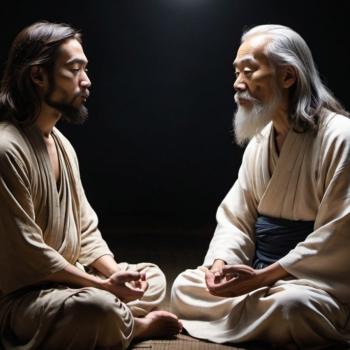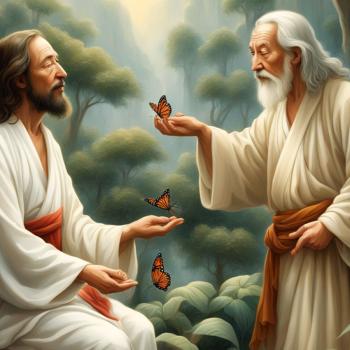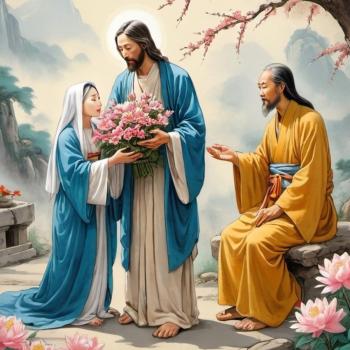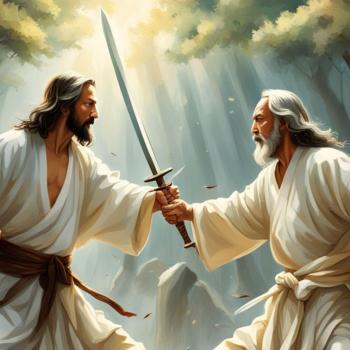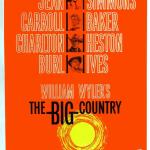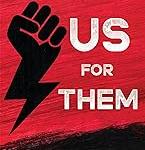Ever carry a cup filled to the brim? Some of it always ends up on your shoes. Jesus and Lao Tzu agree that empty is better than full.
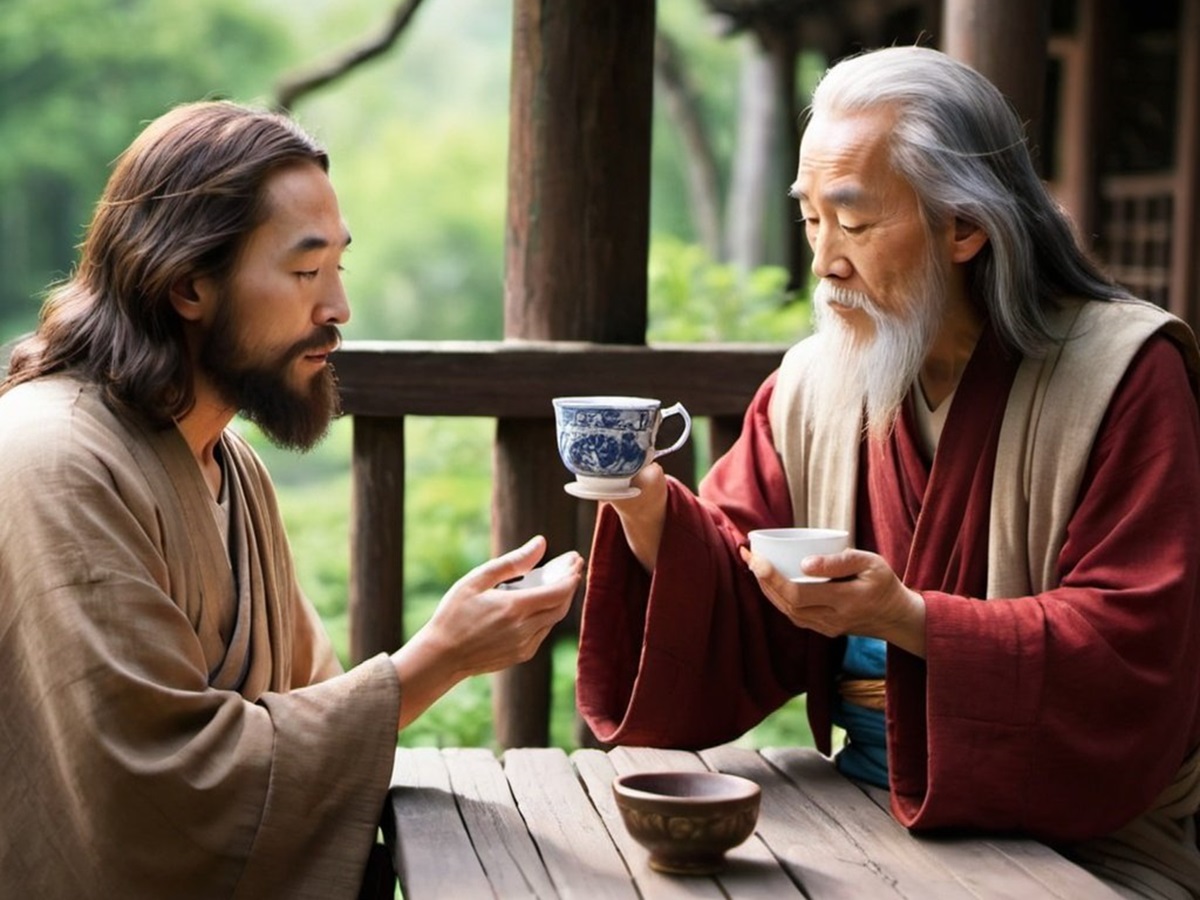
Through the examples of an empty cup and a dull knife, Lao Tzu shows the pathway to heaven. Jesus agrees—empty and dull things are better than full and sharp. In verse eight of the Tao Te Ching, Lao Tzu says:
Tao Te Ching, Verse 9. McDonald Translation:
It is easier to carry an empty cup
than one that is filled to the brim.
The sharper the knife
the easier it is to dull.
The more wealth you possess
the harder it is to protect.
Pride brings its own trouble.
When you have accomplished your goal
simply walk away.
This is the pathway to Heaven.
My Cup Overflows
Every Christian is familiar with the words of the psalmist who said, “You prepare a table before me in the presence of my enemies; you anoint my head with oil; my cup overflows.” From this, many believers get the idea that we’re supposed to walk around with full cups all the time. The idea of overflowing appeals to the Western mindset of acquisition and excess. We want God to bless us beyond our capacity. We expect our spirits and our wallets to be full of divine abundance. Only then will we know that we’ve “made it.”
The Prayer of Jabez
Bruce Wilkinson wrote a popular book back in 2000, called The Prayer of Jabez: Breaking Through to the Blessed Life. This book captured the imaginations of millions of Christians who wanted God to “enlarge their territory.” It promised divine blessing if only believers would learn to pray an obscure prayer from one verse of the book of 1 Chronicles:
Jabez called on the God of Israel, saying, “Oh, that you would bless me and enlarge my territory and that your hand might be with me and that you would keep me from hurt and harm!” And God granted what he asked.
This book, with its theology based on one verse, was all about being filled, having your territory and influence enlarged. Wilkinson saw such blessing as the pathway to happiness, health, and divine protection. Many people bought into the notion that the spiritual life was about being filled to overflowing. Yet, the Tao runs counter to this acquisition-based mentality.
The Value of Emptiness
In contrast, Lao Tzu says, “It is easier to carry an empty cup than one that is filled to the brim.” The world doesn’t understand such backwards thinking. The popular self-care phrase goes, “You can’t pour from an empty cup,” implying that you’ve got fill yourself before you can fill the cups of others. Yet, Taoism emphasizes the value of emptiness.
In the earlier verses of the Tao Te Ching, Lao Tzu has already spoken of the benefit of open minds, empty wells, spacious containers, spacious wombs, open valleys, and the space inside a bellows. In case we haven’t gotten the point, he tells us that an empty cup is better than a full one. How, after all, is God supposed to pour into us if we keep ourselves filled all the time?
The apostle Paul understood this seemingly foolish notion that empty is better than full. In two letters, he wrote, “I am being poured out as a libation.” Since Jesus emptied himself to become a servant to all, Paul could certainly do the same. This involves allowing the ego to take the backseat and being willing to adopt a position opposite from what the world expects.
Not Too Sharp
Lao Tzu continues to give other examples of this seemingly backward approach. A knife is best when it’s not too sharp. This is certainly true with swords. The effectiveness of a sword is not in its keen edge but in the skill used when wielding it. An overly-sharpened sword is easily chipped when the blade is used for parrying. But slip even the dullest blade between chinks in an opponent’s armor, and you’ve gained the victory. The Tao avoids extremes of too hot or cold, overly sharp or dull. The Tao finds perfection in many things the world considers weak.
Godliness with Contentment
The Tao Te Ching says an increase of wealth just means more difficulty in guarding your treasure. Similarly, Paul writes to his student Timothy:
Of course, there is great gain in godliness combined with contentment, for we brought nothing into the world, so that we can take nothing out of it, but if we have food and clothing, we will be content with these. But those who want to be rich fall into temptation and are trapped by many senseless and harmful desires that plunge people into ruin and destruction. For the love of money is a root of all kinds of evil, and in their eagerness to be rich some have wandered away from the faith and pierced themselves with many pains.
The World Vs. the Tao
The world does not understand this kind of wisdom, but the Tao does. When the world says, “Fill your cup,” the Tao says, “Be empty.” The world tells you, “Be sharp,” but the Tao says, “Not too sharp!” As the world continues to hoard more and more wealth for itself, the Tao cautions against accumulation. Paul summarizes this tension in his desire for divine healing, and Christ’s answer that changed his mind:
Therefore, to keep me from being too elated, a thorn was given me in the flesh, a messenger of Satan to torment me, to keep me from being too elated. Three times I appealed to the Lord about this, that it would leave me, but he said to me, “My grace is sufficient for you, for power is made perfect in weakness.” So I will boast all the more gladly of my weaknesses, so that the power of Christ may dwell in me. Therefore I am content with weaknesses, insults, hardships, persecutions, and calamities for the sake of Christ, for whenever I am weak, then I am strong.
Made Perfect in Weakness
Lao Tzu expresses this principle eloquently in the Tao Te Ching. Echoing the sentiment, Paul relates the risen Christ’s poignant words, “Power is made perfect in weakness.” To the world, this seems a contradiction. To the Taoist and to the one who truly listens to Jesus, this makes all the sense in the world. Jesus and Lao Tzu agree: Empty is better than full. Dull is better than sharp. And when we are weak, then we are strong.
Something to Ponder…
What does it mean that “power is made perfect in weakness?” Take a moment to enter silent meditation, focusing on those areas of your life where you are weak. Perhaps you are experiencing a challenge in your physical or mental health. Maybe you’ve been struggling academically, or in your job performance. Relationships might have you flummoxed right now. Is there some other area of your life where you’ve been feeling weak?
Instead of taking the Prayer of Jabez approach, where you want your territory expanded, how can acknowledging and even allowing your weaknesses help in this matter? What would result if, instead of trying to be your sharpest, you let yourself be dull? Or, rather than trying to fill yourself with advice, personal growth and achievements, how would it be if you allowed some breathing space inside your heart? How could this kind of emptiness be better than fulness? In your quest to be fulfilled, have you forgotten the value of emptiness?









